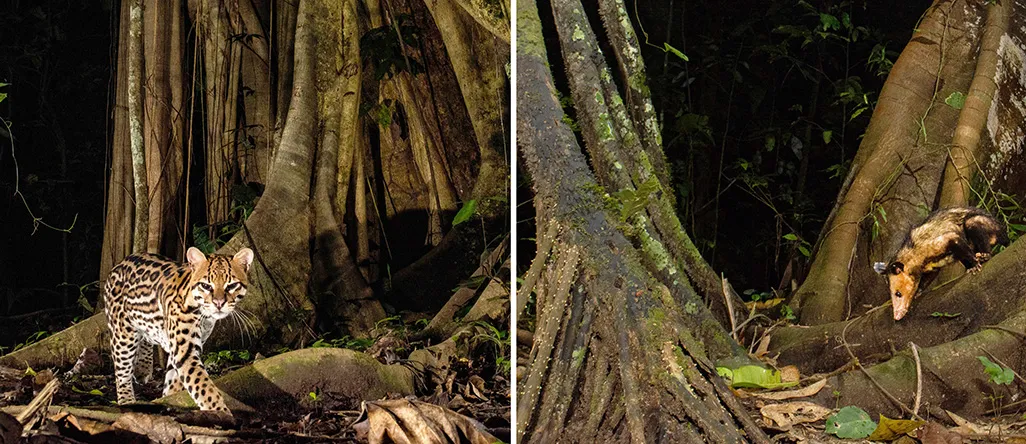Video Reveals an Unlikely Bond Between Ocelots and Opossums in the Amazon, Walking Together Like ‘Old Friends’
Researchers captured the footage by surprise, with cameras initially set up to record bird behavior

Opossums and ocelots appear to team up on Amazonian nights, trekking through the rainforest together, according to videos captured by researchers at the Cocha Cashu Biological Station in Peru.
The scientists originally set up trail cameras to study bird behavior, but they soon noticed something unusual in the footage: an ocelot and a common opossum walking nearly side by side. Though the species are sometimes predator and prey, these individuals moved at a relaxed pace. “Like two old friends walking home from a bar,” says Isabel Damas-Moreira, a behavioral ecologist at Bielefeld University in Germany and senior author of the study, to Clarissa Brincat at the New York Times.
Damas-Moreira and her team contacted researchers across other regions of the Peruvian Amazon and found that some had also witnessed this behavior—an opossum moving across the forest, with an ocelot not too far behind. In total, they gathered four examples of this odd partnership from different locations between 2019 and 2023.
“This suggests that such interspecific associations are likely non-random events,” the team writes in a paper published late last month in the journal Ecosphere.
The researchers also set up an experiment to better understand the relationship between the two animals. They placed fabric strips with the scent of ocelot, puma or a control in front of the cameras. The opossums showed a clear attraction to the ocelot scent—at least five to seven individuals made a total of 12 visits to it—and they would even rub, sniff or bite the fabric. They mostly ignored the other strips, visiting the puma scent only once.
Did you know? The difference between an opossum and a possum
Opossums and possums are both marsupials, but they’re entirely different animals. Possums are native to Australasia, while opossums are native to North and South America and belong to the genus Didelphis. Confusingly, opossums are often just called possums.
The study opens up new questions about animal social behavior in the rainforest, according to a statement from Bielefeld University. It’s still unclear why the opossums and ocelots associate, but one hypothesis is that the opossums use ocelots as chemical camouflage, so that they can hide their scent from other predators. Opossums also have traits that may help ocelots with foraging, according to the statement, such as resistance to viper venom.
“We tend to underestimate how much cooperation there is in nature,” says Erol Akçay, a theoretical biologist at the University of Pennsylvania who was not involved in the research, to the New York Times. He suggests that opossums might guide ocelots to prey they couldn’t bring down on their own, then feed on the leftovers that remain after the ocelots have eaten.
Coyotes and badgers have a similar relationship. The two animals will often hunt together to catch prairie dogs or squirrels, since badgers can dig below ground and coyotes can lead the above-ground chase. “Even though we still do not know if this is the case, we could be witnessing the South American counterpart to the well-known partnership between coyotes and badgers in North America,” adds Damas-Moreira in the statement.
/https://tf-cmsv2-smithsonianmag-media.s3.amazonaws.com/filer_public/2c/6a/2c6a0cce-a146-4673-8044-9a9d30c7d01a/ecs270322-fig-0002-m.jpg)
Diego Astúa, curator of mammals at the Federal University of Pernambuco in Brazil who was not involved with the study, tells the New York Times that the work also highlights how opossum research is still in its early stages. The behavior is unexpected, he explains, because opossums are generally solitary creatures. “We are likely to find more and more surprising records like this,” he says.
Damas-Moreira adds in the statement that while the discovery was accidental, the study shows the importance of observing ecosystems more closely. You never know what you might find. “Nature is often more complex than we think,” she says.
/https://tf-cmsv2-smithsonianmag-media.s3.amazonaws.com/accounts/headshot/Sara_-_Headshot_thumbnail.png)


